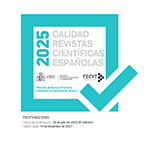Pandemic, politization and hatred: features of disinformation in Spain
Abstract
Despite previous attempts to analyze and combat disinformation, initiatives capable of measuring the phenomenon in a broad and systematic way remain scarce. One of the most productive approaches has been based on the study of de debunks published by the main fact-checking agencies. Focusing on the Spanish case, a quantitative content analysis has been carried out on 4,245 fact-checks made by Maldito Bulo (a branch of Maldita.es, one of the main fact-checking initiatives in Spain) between 2017 and 2022 using a previously validated instrument. The predominant presence of social themes has been identified, although with politics as an underlying and transversal theme in a large majority of content, reinforcing the polarizing role of misinformation. Furthermore, it was observed that half of the debunked content could be used to promote hatred or rejection towards certain groups. Among formats and platforms for the spread of hoaxes, text and Twitter are predominant. Regarding the temporal evolution, together with a greater diversity of formats and platforms, the great disruption that marked the pandemic is confirmed, both in topics as in the amount of debunks, especially in 2020. It was also observed a greater presence of content that could spread hatred in the last two years of the sample.
Downloads
Article download
License
In order to support the global exchange of knowledge, the journal Estudios sobre el Mensaje Periodístico is allowing unrestricted access to its content as from its publication in this electronic edition, and as such it is an open-access journal. The originals published in this journal are the property of the Complutense University of Madrid and any reproduction thereof in full or in part must cite the source. All content is distributed under a Creative Commons Attribution 4.0 use and distribution licence (CC BY 4.0). This circumstance must be expressly stated in these terms where necessary. You can view the summary and the complete legal text of the licence.










